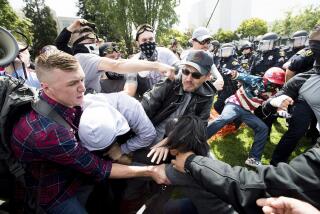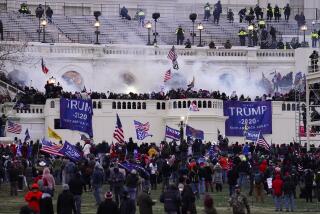High Court Rejects Racial Challenge to L.A. ‘Crack’ Cases
- Share via
WASHINGTON — The Supreme Court on Monday rejected a claim that blacks had been singled out for “crack” cocaine prosecutions in Los Angeles, saying that charges of racial bias by prosecutors require evidence that whites who commit the same crimes get more lenient treatment.
The 8-1 ruling deals another sharp defeat to civil rights advocates who have argued that the high percentage of blacks in prison and on death row stems in part from racism in law enforcement.
Monday’s decision does not close the courthouse door entirely to charges of racially biased prosecutions, but it will make them much harder to prove.
Two lower courts in California, whose rulings the high court overturned, would have set a more liberal standard--placing the burden of proof on prosecutors to rebut a statistic showing that blacks were charged most often with a particular crime.
Instead, the high court said, prosecutors cannot be challenged unless the defense can demonstrate that people of other races are not prosecuted or are treated more leniently when accused of similar crimes.
The case began in 1992, when five black men were arrested after an investigation by Inglewood police and federal drug agents. The defendants were charged under a federal law that requires a sentence of at least 10 years in prison for conviction of selling 50 grams or more of crack cocaine.
The federal public defender’s office in Los Angeles, representing the five defendants, argued that all 24 of the crack cocaine cases it handled in 1991 were brought against African Americans. Judge Consuelo Marshall and the U.S. 9th Circuit Court of Appeals agreed that this statistic raised a strong hint of official bias; prosecutors were ordered to turn over records on thousands of drug cases brought over the last three years.
Prosecutors refused, however, and appealed to the more conservative Supreme Court.
Chief Justice William H. Rehnquist, writing for the court, stressed that prosecutors should be given the benefit of the doubt.
“In the absence of clear evidence to the contrary,” he wrote, judges should “presume that [prosecutors] have properly discharged their duties.”
*
Rehnquist also disputed the notion that “people of all races commit all types of crimes” with equal regularity. He was referring to a “presumption” cited by the 9th Circuit Court opinion written by Judge Stephen Reinhardt of Los Angeles.
On the contrary, Rehnquist said, crime statistics show that one race or ethnic group often dominates in a particular crime. While more than 90% of federal crack cocaine convictions in 1994 involved blacks, whites accounted for 93% of the LSD convictions that year and 91% of those convicted for pornography and prostitution offenses, he said.
Federal investigators have concluded, he noted, that “large-scale, interstate trafficking networks controlled by Jamaicans, Haitians and black street gangs dominate the manufacture and distribution of crack cocaine.”
U.S. Atty. Nora Manella in Los Angeles said she was delighted but not surprised by the ruling.
“This decision effectively puts to rest the simplistic view that the predominance of one race suggests a racist prosecution, any more than numbers of old, balding white males in financial-fraud cases suggests selective prosecution,” she said.
“I don’t think anybody who knows this office thinks there has been a racist motive at work,” she said. “This was just a tactic on their part” to raise concerns about the harsh punishments in crack cocaine cases.
Under the federal drug laws, persons caught with more than 1 ounce of crack cocaine get a mandatory 10-year federal prison sentence. African American leaders have complained about this unusually stiff punishment, but Congress and President Clinton refused to revise it last year.
Manella said that the high court’s ruling, combined with a judge’s decision last month in Los Angeles rejecting a claim of selective prosecution, will put the matter to rest. In that earlier ruling, U.S. District Judge W. Matthew Byrne Jr. examined data on federal and state crack prosecutions and found no evidence of bias.
Whites are picked up for selling crack, Manella said, but usually do not sell it in large quantities.
Deputy Public Defender Barbara O’Connor said that she remains hopeful despite the high court’s ruling.
“We’re not ready to give up the fight,” said O’Connor, who first raised the claim and argued it all the way to the Supreme Court. “This is not an impossible standard to reach. It could have been worse. So we’ll go back before Judge Marshall and present our evidence. . . . I think we all know there is a problem here.”
George Kendall, a lawyer for the NAACP Legal Defense Fund in New York, said that the ruling was unfortunate because it may cut off investigations of possible racial bias in the justice system.
“I would think in a democratic society, where there appears evidence of possible racial discrimination, we would want to get to the bottom of it,” Kendall said.
*
Nine years ago, the high court cut off a landmark statistical challenge to apparent racial bias on death row, despite data showing that killers of whites in Georgia were four times more likely to get a death sentence than killers of blacks.
Only Justice John Paul Stevens dissented from Monday’s ruling (U.S. vs. Armstrong, 95-157).
He said Marshall was confronted with a “conspicuous racial pattern” in the crack cases brought before her. “I fail to see why [she] was unable to take judicial notice of this obvious fact and demand information from the government’s files to support or refute” it, Stevens said.
In other actions, the court:
* Refused to let an Oklahoma town display a Christian cross on its official seal. A lower court said that the cross violates the 1st Amendment’s ban on an “establishment of religion.” Only Rehnquist and Justices Antonin Scalia and Clarence Thomas voted to hear the city’s appeal in the case (City of Edmond vs. Robinson, 95-879).
* Refused without comment to hear the Florida governor’s claim that the federal government is failing to reimburse his state for the cost of serving illegal immigrants (Chiles vs. United States, 95-1249). Lower courts said that the issue is political, not legal. The high court’s failure to intervene is a setback for California officials, who have a similar suit pending.
* Refused to speed up action on an appeal filed on behalf of suspected Unabomber Theodore J. Kaczynski (Kaczynski vs. United States, 95-8785). His lawyers contend that because of government information leaks, his right to a fair trial has been extinguished.
More to Read
Sign up for Essential California
The most important California stories and recommendations in your inbox every morning.
You may occasionally receive promotional content from the Los Angeles Times.











